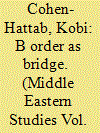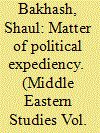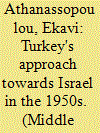|
|
|
Sort Order |
|
|
|
Items / Page
|
|
|
|
|
|
|
| Srl | Item |
| 1 |
ID:
154868


|
|
|
|
|
| Summary/Abstract |
Between 1948 and 1967, Jerusalem was divided by a ‘city line’, dividing Jordan (East Jerusalem) from Israel (West Jerusalem). Between the two sections stood one border crossing called ‘Mandelbaum Gate’. While existing literature on the Gate tends to emphasize its military status – owing in particular to the military convoy that crossed the border on a regular basis – research using sources from that time paints a picture of a border with civilian activity run jointly by two ostensibly warring countries. Whether it was the return of civilians and bodies, tourism coordination, or medical passage, those manning the border worked together to make it bridge, rather than barrier – and may even have paved the way to a peace agreement years later.
|
|
|
|
|
|
|
|
|
|
|
|
|
|
|
|
| 2 |
ID:
154873


|
|
|
|
|
| Summary/Abstract |
From 1921 to 1923, Turkey and the United Kingdom contended for control of the Vilayet of Mosul, now known as northern Iraq. The United Kingdom was the mandatory power in Iraq at that time. Although this crisis, which is known as the Mosul affair, was settled in 1925 in favour of Iraq, Turkey never totally relinquished its historical claim to this strategically important border region. Turkey's persistent claim to the area, and the fact that the region is predominantly inhabited by Kurds whose nationalism shows no signs of waning, make northern Iraq a potentially destabilizing factor in the region. The article will discuss the historical roots of Mosul frontier affairs, which is a legacy of colonialism in the Middle East. This international conflict has many dimensions, but the article will confine itself to the study of the distinguished career of Ali Shafiq, also known as Ozdemir, a Turkish statesman and the architect of Turkish policy during the Mosul affair. This is, to a large extent, a political history of the conflict and the author utilizes British and Turkish archival material and contemporary memoirs, journals, and relevant secondary sources in Arabic, Kurdish, Turkish, and English.
|
|
|
|
|
|
|
|
|
|
|
|
|
|
|
|
| 3 |
ID:
154867


|
|
|
|
|
| Summary/Abstract |
During World War One, both Arabs and Zionists sought to become “the tools of British imperialism.” The British exploited both as their own interests dictated, without giving a thought for future consequences. In 1915, the MacMahon-Husayn correspondence – conducted between Britain's High Commissioner in Cairo and a non-representative Arab Bedouin leader from the Arabian Peninsula – ended inconclusively, without agreement. In contrast, the Balfour Declaration - the culmination of 6 months of British-initiated negotiations with the Zionists, was published in order to further Britain's military, strategic and propaganda interests. At the time, the British considered it to have been a ‘brilliant coup’.
|
|
|
|
|
|
|
|
|
|
|
|
|
|
|
|
| 4 |
ID:
154875


|
|
|
|
|
| Summary/Abstract |
This article examines the change in the discourse of the Muslim Brothers in Egypt regarding the model of a civil state. It outlines a transition in the doctrine of the movement from an all-Islamic state to a modern nation state with Western norms and institutions. The paper traces milestones in the process that led to the acceptance of the civil model into the Muslim Brothers’ rhetoric and political platform albeit a creative interpretation of the concept. Due to the movement's inconsistency and vagueness using this vision, the article focuses on the post-Mubarak era and the Morsi administration in order to test this shift in practice.
|
|
|
|
|
|
|
|
|
|
|
|
|
|
|
|
| 5 |
ID:
154871


|
|
|
|
|
| Summary/Abstract |
This article traces the process that bolstered Israel into becoming one of the world's leading high-tech top-tier defense producers in the world from Reagan's Strategic Defense Initiative to the present multi-layer anti-missiles – the Arrow, David's Sling and Iron Dome. The article analyses the Israeli–American strategic partnership in the context of US/Middle Eastern policies from Reagan to Obama. This is a crucial element in the ‘Special Relationship’ between the United States and Israel.
|
|
|
|
|
|
|
|
|
|
|
|
|
|
|
|
| 6 |
ID:
154870


|
|
|
|
|
| Summary/Abstract |
This article seeks to add another dimension to the growing and extensive research on right-wing Zionism, by returning to an era when the Likud was first created. I will examine the major difference between processes that have led to the two key landmarks in the formative years of the Right in Israel: the establishment of Gahal in April 1965 and the founding of the Likud in August–September of 1973. While Gahal's establishment was a product of a prolonged, determined, patient and conscious effort on the part of Menachem Begin, the establishment of the Likud was, to a considerable degree, forced upon him. Those who were interested in expanding Gahal and creating an alignment of centre-right parties were actually the factors outside Herut, while Herut's more veteran leadership disapproved of these attempts. Within the Herut Movement, the voices that called for the creation of a broad political alignment were those that came from Herut's ‘internal opposition’, which revolved around Ezer Weizman. The article analyses the reasons behind Begin's reservations about a continued right-wing merger, examines the negotiation process and sheds light on the oscillation in Menachem Begin's ideology and politics between the fundamental and the pragmatic poles.
|
|
|
|
|
|
|
|
|
|
|
|
|
|
|
|
| 7 |
ID:
154872


|
|
|
|
|
| Summary/Abstract |
This article focuses on the uprising in 1918–1922 of Ismail Agha of Shikak (a.k.a. Simko) in Iranian Kurdistan and how he has been portrayed in Persian historiography. Painting Simko simply as another Kurdish rebellious chief with no nationalist aspirations leaves important questions unanswered. Simko introduced a number of firsts in Kurdish political history to Iranian Kurdistan, yet his innovations have generally been overlooked. Simko was conscious of, informed by, and founded his politics upon the communal distinctions deemed to legitimize varying degrees of Kurdish self-rule. In addition to his political and military activities, Simko co-founded the first Kurdish school in Iran, published the first Kurdish–Persian newspaper, and made Kurdish the official medium of his reign. This article draws on memoirs, personal accounts, and other unexplored primary documents to show a more complex picture of Simko's resistance, problematizes some idées reçues about Simko and his ethno-nationalism, and explores inconsistencies in the existing literature on the subject.
|
|
|
|
|
|
|
|
|
|
|
|
|
|
|
|
| 8 |
ID:
154874


|
|
|
|
|
| Summary/Abstract |
When Reza Shah, the former ruler of Iran, died in exile in Johannesburg, South Africa, in 1944, he left some £110,000 in cash in his bank account and valuables and other items worth another £20,000. But he left no will; and the Union government proceeded to impose a tax amounting to over £43,000 (one-third of the total value) and to distribute the remainder among heirs as specified in Union law for persons who had died intestate. Reza Shah's son, Mohammad Reza Shah, the ruling Iranian monarch, hard up for money, fought these requirements. He claimed everything in his late father's possession was his, and that neither estate taxes nor distribution to heirs applied. A four-year battle over the estate ensued. It was eventually resolved, but only after vigorous efforts by two British ambassadors to Tehran, endeavours at the highest levels of the British government; the involvement of the South African prime minister and, finally, an act of the South African parliament. This article examines the intricate tug-of-war surrounding the settlement of the estate of Reza Shah and what it tells us about the principal parties involved.
|
|
|
|
|
|
|
|
|
|
|
|
|
|
|
|
| 9 |
ID:
154869


|
|
|
|
|
| Summary/Abstract |
Within the context of Turkey's relationship with Israel, the 1950s are remembered largely as the decade when bilateral relations developed dramatically reflecting the US orientation of Adnan Menderes's foreign policy. On closer observation, however, one cannot fail to notice that there was more ebb than flow in Turkey's policy towards Israel which already assumed the double-faced profile (cold or reproachful in public/positive behind closed doors), which is usually associated with the next two decades. Drawing on substantial research in official US and British archives, this article explores the multiple considerations which informed the approach of the Menderes government towards Tel-Aviv. Crucially, it places the Turks’ approach within their broader Middle Eastern policy with the aim of showing that it was shaped not only by their relationship with their powerful ally, the United States, but also by the need to look after relations with neighbourly Arab regimes.
|
|
|
|
|
|
|
|
|
|
|
|
|
|
|
|
|
|
|
|
|